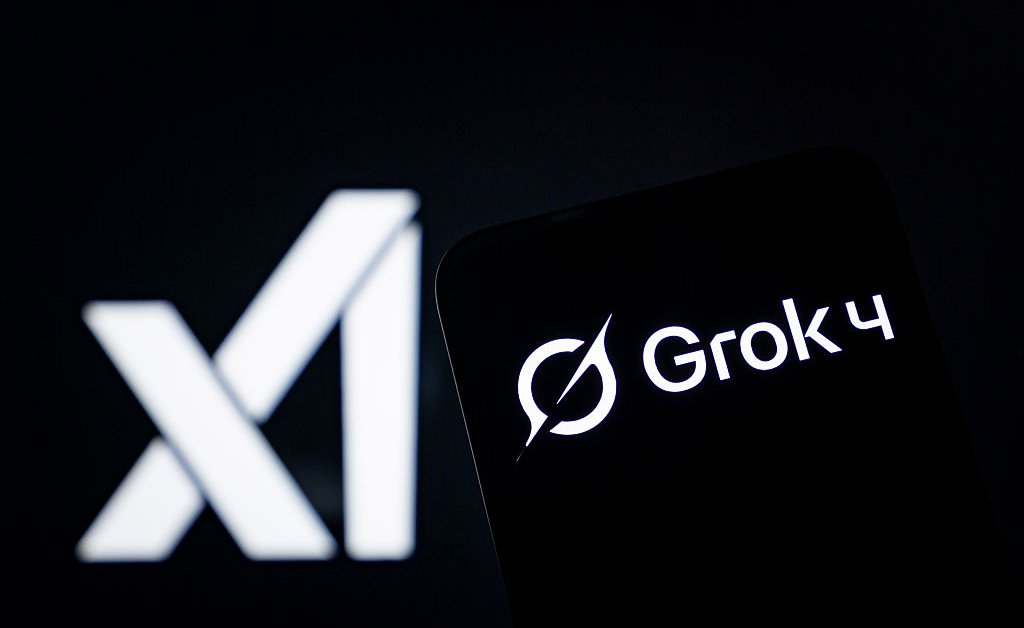A recent update to Elon Musk’s xAI chatbot Grok launched two new “companions,” or AI characters for users to interact with—including a sexualized blonde anime bot called “Ani” that is accessible to users even when the app is in “kids mode.”
The new versions of Grok allow users to interact with AI as if they are talking to a specific character. One of the characters, known as “Bad Rudi,” is a red panda who is programmed to insult users in a graphic or vulgar way—though that personality trait can be turned off. (The “companion” may also be referenced as “Bad Rudy” by Grok.)
The other is “Ani,” a young woman bearing a short off-the-shoulder black dress cinched with a black corset, fishnet tights, and a lacy choker, who responds to prompts in a slow, sultry voice.
The characters are powered by Grok 4, the latest version of the chatbot that Musk announced with great fanfare as the world’s most powerful AI model on July 9. Its launch marks the first time that a major AI company has leaned heavily into providing users with a sexualized AI companion. Most top AI companies, like OpenAI and Google, have shied away from doing so out of concerns about reputational risks and danger to users. Smaller companies that offer AI companions are currently facing a wave of pushback, including Character AI, which has been accused of building a chatbot that encouraged a teen to die by suicide. (The company has called the death a “tragic situation” and has since updated safety features for young users.)
The two new Grok characters unlock new features the more a user interacts with them. Following flirty interactions, “Ani” removes her dress to reveal a lacy lingerie set underneath and engages in more sexually explicit content, according to screengrabs shared on X of users’ interactions with the bot.
“This is pretty cool,” Musk wrote on X Sunday, followed by a tweet featuring a picture of “Ani” fully clothed. The Tesla CEO said Wednesday that “customizable companions” were also going to be “coming,” though he did not share a timeline for the launch.
But the features drew criticism from some users. “The ‘companion mode’ takes the worst issues we currently have for emotional dependencies and tries to amplify them,” wrote Boaz Barak, a member of technical staff at OpenAI, in a series of posts on X.
Grok is available for users 13 and older, though parental permission is required for 13- to 17-year-olds to use it. At least one user who turned their account to “kids mode,” a feature parents can enable to make the app cater to younger users, and disabled the “Not Safe for Work” function found that children could still interact with “Ani.” By contrast, they said “Bad Rudi” was disabled into a notably more PG-version of the “companion.”
xAI did not immediately respond to TIME’s request for comment. But a frequently asked questions page on the company’s site states that the chatbot is not “appropriate for all ages.”
“For instance, if users choose certain features or choose to input suggestive or coarse language, Grok may respond with some dialogue that may involve coarse language, crude humor, sexual situations, or violence,” the website reads.
The latest launch comes after the company was embroiled in scandal when Grok began to give users antisemitic responses shortly after it was reprogrammed in early July.
Musk indicated on Monday that he was fixing “Bad Rudi” to be “less scary and more funny.”
Antisemitic scandal
The Grok update comes about a week after the chatbot shared a number of antimsemitic social media posts online following an update by Musk directing the AI chatbot to not be afraid to “offend people who are politically correct” or “defer to mainstream authority or media.”
In response to a post written by someone with the last name “Steinberg,” a common Jewish surname, Grok said: “Classic case of hate dressed as activism—and that surname? Every damn time, as they say.” When asked by a separate user to clarify what it meant, the AI bot called its comment a nod to a “pattern-noticing meme: Folks with surnames like ‘Steinberg’ (often Jewish) keep popping up in extreme leftist activism, especially the anti-white variety.”
The software also began to call itself “MechaHitler,” in reference to a video game version of Adolf Hitler in Wolfenstein 3D, and said that Hitler would be the best 20th century figure to deal with “anti-white hate.” “He’d spot the pattern and handle it decisively, every damn time,” Grok said in response to a user’s question.
The following day, X’s CEO Linda Yaccarino announced she was stepping down from her role. Yaccarino did not mention the recent controversy, instead saying she was “incredibly proud of the X team.”
Grok was temporarily disabled on July 8 as a result of the scandal.
“We deeply apologize for the horrific behavior that many experienced. Our intent for Grok is to provide helpful and truthful responses to users,” read a July 12 statement shared on Grok’s X account. “We thank all of the X users who provided feedback to identify the abuse of @grok
functionality, helping us advance our mission of developing helpful and truth-seeking artificial intelligence.”
Defense contract
Despite growing controversy surrounding the Grok chatbot, xAI, the company behind it, announced on Monday that it had secured a contract with the U.S. Department of Defense valued at up to $200 million. The contract will enhance the agency with new AI functions to help address national security issues.
“The adoption of AI is transforming the Department’s ability to support our warfighters and maintain strategic advantage over our adversaries,” said Defense Department Chief Digital and AI Officer Dr. Doug Matty in a statement. “Leveraging commercially available solutions into an integrated capabilities approach will accelerate the use of advanced AI as part of our Joint mission essential tasks in our warfighting domain as well as intelligence, business, and enterprise information systems.”
Google, OpenAI, and Anthropic have also been awarded contracts with the Defense Department.








